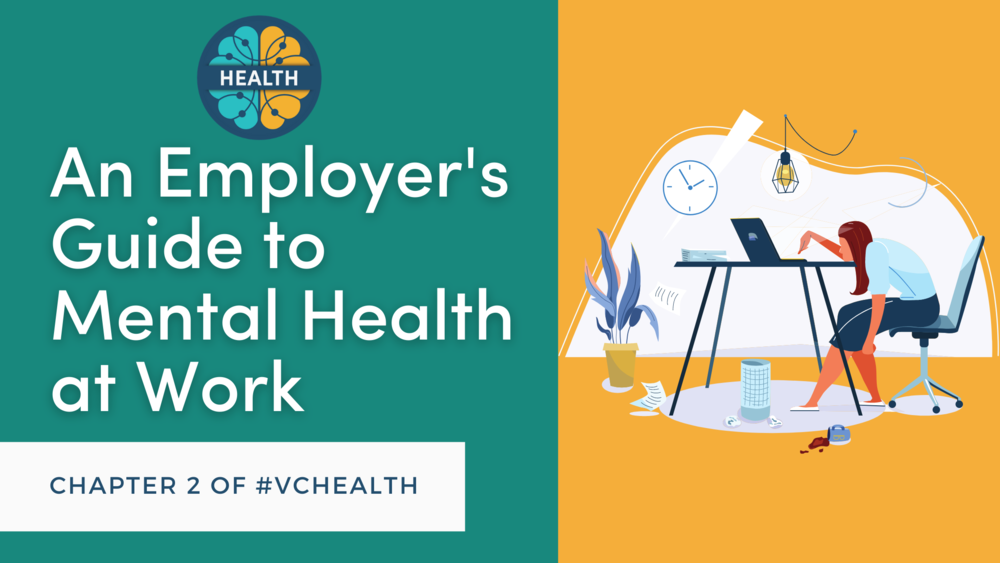
Awareness of mental health issues, and how these issues affect the workplace is on the rise. The COVID-19 pandemic exacerbated issues like anxiety, depression, and burnout for many people, and one of the best things employers can do for their employees and their business is to take a protective approach to mental health.
We welcomed Bruce Trimble of The Bridgeway and Ken Clark of Chenal Family Therapy for a discussion of how employers should approach mental health in the workplace, and they offered practical tools and best practices that any employer and employee can put into practice to create a better, more successful environment for everyone. Read our recap, or scroll to the bottom to watch a video of the session.
Addressing Mental Health Issues at Work
The first thing employers and coworkers can do is learn to identify signs that someone might be struggling with a mental health issue. Here are seven red flags to consider:
-
Changes in work habits
-
Changes in physical appearance
-
Changes in demeanor
-
Dramatic changes in personality or conduct
-
Increased absenteeism or tardiness
-
Outbursts and mood swings
-
Seeming withdrawn or avoiding interaction
Say you notice some of these indicators in an employee or coworker. What next? It’s important to approach each person with thought and care.
You could raise the possibility of accommodations if needed, consider providing access to an Employee Assistance Program, or have a third-party mental health provider conduct an assessment. Any steps you take need to be confidential and make sure to document meetings fully.
Here’s what NOT to do:
-
Don’t offer a pep talk
-
Don’t be accusatory
-
Don’t say “I’ve been there” unless you really have been there.
-
Don’t try to diagnose the underlying issue, even if you suspect a certain illness or problem. Focus on the behavior that concerns you and how you want to help.
-
If you learn that a particular illness is causing the action, do not ask what caused the condition. Focus on solutions.
-
They may not know or be open to acknowledging a mental health issue. If that is the case, there may be little you can do to help. At this point, focusing on work performance is the best approach.
Above all, practice empathy.
Preventing Mental Health Issues at Work
One piece of good news is that addressing mental health doesn’t have to be a reactive process. Employers can and should take a proactive approach – similar to preventative healthcare, you can take measures to prevent many mental health issues or reduce their severity before things reach a breaking point.
Here are a few tools to get you started.
-
Remember that fear is one of the greatest drivers of unproductive behavior. On the flip side, the absence of fear is the greatest driver of creativity and innovation. What are you doing to destroy fear in your workplace?
-
Try reading “An Everyone Culture” to learn more about how to create a culture that is positive and productive.
-
Leaders: you go first. Make it safe to acknowledge the struggle, take mental health seriously, and prioritize emotional intelligence. The culture at your workplace will follow your lead.
-
Think about job design, job match, and job feedback for each employee.
-
Job design – does the employee know what they are supposed to do, and do they fully understand expectations?
-
Job match – does the employee feel that they are a good match for the job as it’s designed? It must be safe for the employee to tell the truth about this. Then you can consider adjustments that will make everyone happier and more productive.
-
Job engagement – are they still engaged with their responsibilities after 6 months, a year, 5 years? People want to be invested in and proud of their work – they spend half their waking hours there. Check on this regularly.
-
This is huge: gratitude. Gratitude is like the antithesis of fear. In personal life and in work life, practicing gratitude is one of the very best tools of mental health wellness. Think of ways to implement gratitude campaigns in your workplace that are genuine. It can be a powerful inoculation against many mental health struggles.
This article is our paraphrased recap of The Venture Center’s second #VCHealth event, Mental Health Toolkit for Employers. We will continue this essential conversation on the last Friday of every month this spring, with subject matter experts discussing a range of mental health issues and offering practical advice. Sign up for the VC Newsletter to get the heads up on our mental health series and all of the other events supporting entrepreneurs we’ve got coming up.
UPCOMING VCHealth Event: REGISTER HERE the next event – VCHealth | Mental Health and Significant Others. #VCHealth events feature a recorded presentation followed by an off the record Q&A session.
